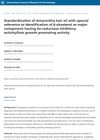 September 2021 in “International Ayurvedic Medical Journal”
September 2021 in “International Ayurvedic Medical Journal” Bhringraj capsule and oil with Nasya effectively reduce hair fall and related symptoms.
 January 2020 in “Elsevier eBooks”
January 2020 in “Elsevier eBooks” Plant-based chemicals may help hair growth and prevent hair loss but need more research to compete with current treatments.
[object Object] 
Pimpinella anisum L. extract significantly boosts hair growth in mice.
 August 2017 in “Indian journal of history of science”
August 2017 in “Indian journal of history of science” The manuscript "Strīvilāsa" offers ancient Ayurvedic knowledge on women's health, beauty treatments, and reproductive care.
 57 citations,
October 2021 in “Journal of ethnopharmacology”
57 citations,
October 2021 in “Journal of ethnopharmacology” Indian herbal medicine shows promise for treating skin diseases but needs more research to prove effectiveness.
 2 citations,
September 2020 in “Journal of Drug Delivery and Therapeutics”
2 citations,
September 2020 in “Journal of Drug Delivery and Therapeutics” Some plants can promote hair growth and are becoming more popular due to fewer side effects.
September 2024 in “Journal of Ayurveda and Integrative Medicine” Ayurvedic treatments can improve symptoms and quality of life for systemic sclerosis patients.
[object Object] 
Nanocarriers with plant extracts show promise for safe and effective hair growth treatment.
 August 2021 in “International Journal of Research in Dermatology”
August 2021 in “International Journal of Research in Dermatology” Amarantha hair oil contains β-sitosterol, which helps promote hair growth.
January 2020 in “Indian Journal of Pharmaceutical Sciences” Natural products show promise for new hair loss treatments.
 4 citations,
March 2020 in “Journal of Cosmetic Dermatology”
4 citations,
March 2020 in “Journal of Cosmetic Dermatology” Plumbago zeylanica extract helps hair growth and reduces a hair loss-related enzyme.
 July 2023 in “Journal of Indian System of Medicine”
July 2023 in “Journal of Indian System of Medicine” Ayurveda can help treat premature hair graying with lifestyle changes and herbal remedies.
 November 2023 in “International Journal For Multidisciplinary Research”
November 2023 in “International Journal For Multidisciplinary Research” Herbal hair oil made with natural ingredients helps reduce hair loss, dandruff, and graying.
 December 2018 in “Journal of harmonizrd research in applied science”
December 2018 in “Journal of harmonizrd research in applied science” Yoga and Ayurveda, including stress management and herbal oil use, can potentially reduce hair loss and promote hair growth, with further research needed for therapy protocols.
 November 2023 in “Research journal of pharmacy and technology”
November 2023 in “Research journal of pharmacy and technology” Medicinal plants may effectively treat hair loss.
 2 citations,
January 2017 in “Clinical and medical investigations”
2 citations,
January 2017 in “Clinical and medical investigations” Herbal lotions are effective for severe hair loss, with a 64.8% success rate, but relapse is common and long-term management requires allergen control and possible corticosteroid use.














